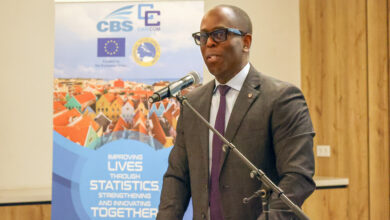(Caribbean Community Secretariat, Turkeyen, Greater Georgetown, Guyana) I wish to thank the organisers of this event for offering me the opportunity to interact with you, or as your flyer indicates, to be intimate with you this afternoon. In particular I want to thank Nirad for his patience with the time it took to get me here.
Colleagues, the importance of the services sector to CARICOM Member States is well documented and in recognition of this fact and of the structural challenges within the sector, it was agreed in 2001 to facilitate the creation of service coalitions. We now have ten such coalitions in the Community and the Trinidad and Tobago Coalition of Service Industries is undoubtedly one of the most vibrant of these. This is not surprising given the fact that the sector in Trinidad and Tobago is the second largest in the CSME after Jamaica.
The coalitions were established to represent the sector and its specific interests, support the development of the industry including the setting of standards and to engage in export promotion and marketing. It also provide an excellent opportunity for an interface between the private and public sectors.
I take this opportunity to congratulate the stronger Coalitions in the Region for their readiness to assist their weaker counterparts in achieving the objectives set out, and the Trinidad and Tobago Coalition has been particularly outstanding in this regard. It is my understand that TTCSI is serving as co-ordinator for the regional network of services coalitions.
Mr Chairman, ladies and gentlemen, my assumption of office last August came at the time of one of the most challenging periods in the Community’s development. On the international front there was a global economic and financial crisis which still lingers and may well be with us throughout this year and next year. On the regional and domestic front, the resources, human and financial, are under strain as most of the CARICOM Member States are experiencing difficult economic times, facing high sovereign debt, high unemployment and weak economic growth – and all this in the face of an increasingly impatient public, seeking assurance that these challenges will be overcome in relatively short order.
I know the automatic response tends to be a focus on seeking to protect national interests by looking inward. However I am convinced that this situation presents us with an opportunity to use the strengths of community and our Community arrangements, to act in concert to overcome these challenges. In doing so we would be able to realise the benefits and the development of our economies as envisioned by the Revised Treaty of Chaguaramas, including the CARICOM Single Market and Economy (CSME). At their Special Retreat in Guyana in May last year, our leaders outlined the priorities and the vision they had for the Community. The services sector was among the priority areas identified as key to the growth and development of the Community. The sector was also identified in the vision document produced by Professor Norman Girvan and others as one of the drivers of the regional economy in going forward.
There was a clear recognition in both instances that of all the sectors in the regional economy the largest is services. It accounts for more than 65% of total employment and output. The CSME collectively enjoys a surplus in trade in services with third countries which averaged approximately US$ 2.9 billion per annum during the period 2000 to 2008. This was fuelled primarily by the trade in travel services. More importantly that surplus helped to offset most of the deficit in trade in goods which occurred during the same period.
Member States have agreed to develop a regional strategic plan for Services and during the next two years the plans for seven sectors are to be rolled out –
• Financial Services;
• Information and Communications Technologies;
• Professional Services;
• Tourism Services;
• Education Services;
• Health and Wellness Services;
• Cultural, Entertainment and Sporting Services.
Our diverse tourism product continues to be the major contributor to the Region’s gross domestic product and, with the bourgeoning interest in eco-sports and community tourism, this can become even more significant. The Region has also been attracting off-shore tertiary education institutions and increasing interest has been shown in the potential for Health and Wellness tourism. Other areas of the sector that have potential for a significant increase in earnings include construction, creative industries, and financial and professional services.
Our Cultural Services are in great demand whether it is in the performing or visual arts. As recognised as we are in these fields we can do more to benefit from the global market in creative goods and services which reached US $593 billion in 2008, according to the Creative Economy Report (2010) by two United Nations Agencies.
A critical component to the success of this sector is the role of infrastructure services such as: ICT, including efficient and low-cost telecommunications services; multi-product, low-cost and easily accessible financial Services; and universal education from early childhood to tertiary level education Services. Of these ICT has been identified as the main driver of the phenomenal growth of the services sector recorded during the past two decades.
National consultations are currently taking place on a Draft Regional Policy for the Provision of Professional Services in the CSME. Major elements of these proposals include a definition of a professional, and the establishment of independent sector-specific regulators and regulations. This will complement work that had been done on a Draft Professionals Bill for the CSME. Proposals on these two pieces of work should be submitted to the Council for Trade and Economic Development at its meeting which is scheduled for July 2012.
Once these proposals are approved, the Community would have a regulatory framework for the provision of professional services in the CSME. It is one of my disappointments that this process has taken so long and efforts are being made to finalise this critical element of the operations of the sector. The Secretariat continues to work with the Ministries responsible for International Trade as well as Ministries with responsibility for Legal Affairs to ensure the requisite legal framework is in place for the operation of Services and Services suppliers.
Under the 10th European Development Fund (EDF), 3.2 million Euros have been assigned to support the Region in the development of the services sector. Of this sum approximately 960,000 Euros have been assigned to strengthen regional and national support organisations including but not limited to, Coalitions of Services Industries and Chambers of Commerce, to assist services suppliers and consumers.
These funds will be spread over a four year period. The interventions will include:
• Consultations with the Coalitions of Services Industries and/or similar bodies to determine specific interventions;
• Missions and meetings for market penetration activities for priority sectors;
• Strengthening of Coalition of Services Industries and equivalent bodies in all States. This includes training; development of networks to promote best practices; development of business services toolkits; development of planning and marketing capabilities for the services sector – based on the needs identified; workshops and seminars; study tours and short term technical assistance.
The Secretariat is also working with the Caribbean Network of Services Industries and Caribbean Export to assist the sectors in the preparation for the negotiation of their Mutual Recognition Agreements.
Mr Chairman, also emanating from that Special Heads Retreat was the mandate to consolidate the gains of the Single Market. This effort at consolidation must be linked to the imperative of expanding production and enhancing the competitiveness of our producers and service providers, which compels us to place greater focus on the enabling environment and sector development.
Globalisation has had an impact on the way people live and do business around the world. Innovations in ICT and transport have shrunk the dimensions of time and space and expanded the concept of markets. Competition has become stronger and consolidation of businesses as a means of achieving economies of scale has continued apace.
All of this emphasises the need for firms in our Region to enhance their level of competitiveness, through increased productivity and production and to embrace innovation. Particularly in our services industries, such initiatives would allow us to maximise the opportunities within the CSME as well as exploit those provided by the trade agreements the Region has concluded. In so doing, we would also be moving closer to achieving one of the principal goals outlined at that Retreat – that of job creation. It is clear that the private sector is a sine qua non to achieving the results from those priorities laid out by the Heads of Government.
Mr Chairman, the CSME remains as relevant today as when the idea was first conceived in Grand Anse in 1989. Moreso, in the current environment, the CSME represents tremendous potential to achieve the goals of growth and employment and to provide business opportunities with respect to both manufacturing and services. It is a vehicle through which businesses in Trinidad and Tobago, utilizing the enlarged single economic space, have been able to export slightly more than US$2 billion in goods to the rest of CARICOM in 2010.
In going forward, if we are to realise the full potential of the CSME for all our Member States, it will without doubt require greater collaboration between the public sector and the private sector. This will also assist in fulfilling another priority identified by our Heads, namely making the weak strong and the strong stronger. The Community and its Member States must do what is necessary to strengthen relations with and build the private sector which actually produces, trades and creates jobs. Given the current relative sluggishness of some regional economies, tremendous pressure is put on Governments to stimulate sustained growth and employment. It is therefore critical that the regional environment for private sector involvement and growth be enhanced in order to provide much needed employment.
It is becoming more and more evident that the time is now for a more structured interface between the regional public and private sectors and in doing so, to include other stakeholders such as labour. It was with this in mind that the Caribbean Business Council was conceived as an umbrella body both to advance the interests of the regional private sector in the Community and to work with the public sector to ensure the smooth operation of the CSME.
The latter is critical judging from what I have been told by the private sector in my interactions in nearly every Member State. The message is that there is a pressing need for us to review the governmental processes which have a bearing on the cost of doing business in our Community. An important element is the ease with which you should be able to conduct your business throughout the Region. As was stated yesterday in the meetings of CEOs of Central America and the Caribbean by a Caribbean business leader, the private sector is not necessarily asking for more incentives. What they need is less disincentives.
We should take note that the World Bank’s Ease of Doing Business Index ranks CARICOM countries at varying levels ranging from 52 to 174. Further, a study conducted by the Inter-American Development Bank (IDB) found that CARICOM intra-regional trade in goods can double from its current 16 per cent of total trade if we address issues relating to trade facilitation and transportation.
This suggests that we still have a long way to go in terms of improving and harmonising our policies and procedures. And we have to move quickly to remedy this situation as the absence of such transparent and harmonized procedures not only retards trade, creates distortions in the Market and leads to uncertainty, but affects competitiveness, profit margins and the final price to the consumer. An important maxim in business is “time is money”. One business person said to me that trade facilitation and the ease of doing business are as of equal importance, if not more, as are fiscal incentives.
Yes, there are fundamental problems. Many of the enterprises in the Region are characterised by outdated equipment and production methods, challenges in supply capacity and value chain management, limited economies of scale, limited access to affordable finance and lack of market knowledge and/or intelligence. Our Region is also confronted by insufficient, irregular and costly air and sea transport, inadequate support services, and in some cases costly telecommunications and electricity services which contribute to high production costs and limit the prospects for business growth and expansion.
These factors coupled with limited national and human resource endowments combine to push production costs above globally competitive levels. Of course, there are many exceptions and best practices within our Region which demonstrate that we can be competitive globally.
For instance, I have been to factories in St Kitts and Nevis which specialise in the production of top quality hi-tech goods for the international market. These factories, which are significant employers, are taking advantage of the Economic Partnership Agreement (EPA) with the European Union (EU), as well as exporting to the United States of America (USA), Latin America and Asia, including China. Exports to the USA alone amount to almost $68 million annually.
The challenge we are striving to overcome at the level of the Community is to create an environment for you to prosper and contribute to the development of this Region and advance your prospects in the global market place.
The lack of standardisation of procedures at ports of entry for goods, for example, is a matter that I have taken on board and will seek ways to facilitate a solution. In fact, you may be aware that the CARICOM Customs Committee has been working on Harmonized Customs Legislation. That work is well advanced and will no doubt be a major boost to facilitating trade in the Community.
The facilitation of agricultural trade is an important part of the Community’s economic and trading arrangements and in that regard much needs to be done in respect to Sanitary and Phyto-sanitary Rules and Regulations. The recently formed, but not yet operational, Caribbean Agricultural Health and Food Safety Agency (CAHFSA) would be at the centre of harmonizing the different policies, practices, requirements and standards applied by different CARICOM countries to facilitate the free flow of agricultural goods.
I am convinced that the agriculture and agri-business sectors also provide tremendous opportunity for economic activity and growth and can contribute significantly more to boosting intra-regional trade and to the overall development of our Community and its Food and Nutrition Security. And as we grow our goods sector so too will our demand for business and other services grow.
In recognition of the critical importance of transportation to regional integration, following a study, funded by the Government of Trinidad and Tobago, the start of a fast-ferry service for passengers and cargo in the southern Caribbean is imminent. Also, the CARICOM Secretariat has been partnering with the Caribbean Association of Industry and Commerce (CAIC), the OECS Secretariat and the ACP-EU Centre for the Development of Industry in a project, aimed at examining ways in which regional small-vessel owners and operators and other industry representatives could upgrade the standard of vessels and improve the scheduling of their operations. It is expected that the outcome of this collaboration will lead to some improvement in the Maritime Transportation sector.
Policy wise, work is ongoing on a Community Industrial Policy. At present, a Draft is before the Secretariat and it is intended that before long, it would be presented to Member States for final approval.
The goal of that Policy is to achieve “market-led, internationally competitive and sustainable production of goods and services for the promotion of the Region’s economic and social development.” A key element in achieving that goal would be the cross-border utilisation of natural and human resources, capital and technology.
Having recognised that the vast majority of our private sector is in the micro, Small and medium enterprise category, we are seeking to promote the further development of these enterprises through a project titled, “Integrate Small and Medium Enterprises (SMEs) into the CSME”. Among its objectives are an increase in the number of production integration possibilities for SMEs and an increase in SME productivity in those industries where an international competitive advantage may exist. We are in the early stages of that piece of work which is as a result of collaboration with the Caribbean Association of Small and Medium Size Enterprises.
Mr Chairman, colleagues, our Community has signed a number of trade agreements with Third Countries. In many cases, however, firms in the Region are not in a position to take advantage immediately of whatever opportunities these may present due to capacity constraints and the need to become more competitive and market oriented. However, as you are well aware, there are avenues for support provided by regional institutions such as Caribbean Export, which have been well utilised by the private sector here in Trinidad and Tobago who has been very active in accessing the resources available through that organisation.
The Inter American Development Bank has been assisting both through the Compete Caribbean Project which is primarily aimed at the private sector and has $US 40 million at its disposal, as well as in the development of an Aid For Trade Strategy along with the Secretariat. That Strategy is to be used to approach international development partners for support to substantively build CARICOM’s production and trade capacity including ICT and maritime transportation. Such support should allow the Region to make significant competitiveness gains in the short to medium term.
These gains should also be translated into the ability to take advantage of the trade agreements which we have entered into, and others being negotiated. We are now in the fourth year of implementation of the CARIFORUM-EU Economic Partnership Agreement. The Secretariat is actively engaged in building awareness among the public and private sectors in Member States of its Provisions and the opportunities it offers. You the private sector play a key role as we advance with the implementation of the EPA in providing the level of specificity that is needed to ensure that the interventions respond to your needs. This will allow for the crafting of projects for the development of the services sector and enhance participation in the European markets and the global economy.
The pace for negotiations with Canada for a Trade and Development Agreement has been slow and is a cause of concern. Our ministers met last Friday to take stock and to encourage our negotiators to increase the tempo beginning with the next round scheduled in June and aiming to conclude before CARIBCAN expires in 2013.
These negotiations also provide an avenue for meaningful input from the private sector which needs to play a crucial role in every step of the process so that in the end the Agreement will respond to its needs. In this regard participation in national consultations and in the development of proposals for the technical working groups will be important.
Also, the Community is in the process of arranging for an engagement with the authorities in the Dominican Republic with a view to revitalizing the CARICOM-Dominican Republic Free Trade Agreement. We expect that the regional private sector will be integrally involved as we move forward with this engagement. The trade in services provisions of that Agreement are yet to be negotiated.
All of these measures I have outlined are set in the context of encouraging private sector growth and competitiveness which, in turn, would lead to profits and the creation of employment. We are all in this together and I would surely welcome any suggestions coming from you that would enhance the measures outlined to improve the environment and the conduct of business in the Region.
My friends, opportunities abound in this services driven-era and the Secretariat is doing all that it can to ensure that the providers in our Community are fully seized of them and are capable of exploiting them. I
THANK YOU.





